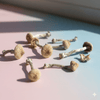I knew that reishi was good for brain health and protecting against neurodegenerative diseases, but I recently came across a study that suggests reishi could have nootropic properties - meaning it can enhance cognition and learning.
Reishi explained
Reishi (Ganoderma lucidum) is a type of mushroom that has been used in traditional Chinese medicine for thousands of years.
It is also known as the "mushroom of immortality" due to its potential health benefits. Reishi is known to have various medicinal properties, including blood sugar regulation, antioxidant, antibacterial, antiviral, and anti-tumor.
Reishi’s brain protecting effects
A number of recent studies have shown that reishi mushroom has profound neuroprotective effects, and may even be useful in treating or preventing neurodegenerative diseases like Alzheimer’s.

Studies show it can delay the progression of Alzheimer’s, improve cognitive function and quality of life.
It works by preventing brain cells from dying, modulating the immune system to suppress inflammation, and inhibiting an enzyme that stops the transmission of nerve impulses in the brain.
In one review, researchers write, “as a natural medicinal mushroom, G. lucidum has the potential to be developed as an effective adjuvant for AD treatment owing to its therapeutic efficacy against multiple pathogenesis of AD.”
Reishi’s nootropic effects
The study I mentioned in the intro found that giving reishi to animals over 7 weeks helped lower their blood pressure just as much as a common blood pressure lowering drug.
It also found that reishi increases blood flow to the brain and changes the balance of neurotransmitters, making them more excited (active) and increasing brain activity.
The researchers conclude: “Changes in cerebral blood flow and ratios of neurometabolites suggests reishi has a potential nootropic effect.”
This study suggests that reishi can improve memory and learning abilities in those suffering from neurodegenerative diseases like Alzheimer’s “through maintaining neuronal structure and function.”
In this study, the researchers discovered that reishi also inhibits AchE activity, much like physostigmine.
Acetylcholinesterase (AchE) is an enzyme that breaks down acetylcholine, a neurotransmitter that plays a crucial role in memory, learning, and other cognitive functions.
Physostigmine is a drug that inhibits the activity of AchE, thereby increasing the levels of acetylcholine in the brain.
This suggests that reishi may have a similar effect on acetylcholine levels in the brain, potentially leading to improved cognitive function and memory.

Other reishi benefits
- Reduces blood sugar
Recent research has focused on the benefits of resihi in treating metabolic disorders such as diabetes and obesity.
It contains compounds have also been found to improve insulin sensitivity and lower blood sugar levels in animal models of diabetes and obesity.
- Enhances immune system
Polysaccharides found in reishi have been shown to increase the activity of certain white blood cells, which play a critical role in the body’s immune response.
Among these polysaccharides, beta-glucans have a mechanism to prevent infections, including COVID-19, due to increased inflammatory responses by upregulating pattern recognition receptors.
- Anti cancer effects
Resihi-derived polysaccharides and triterpenoids have been found to have anticancer effects through various mechanisms.
The polysaccharides from reishi act by stimulating the immune system to produce cytokines and activate the anticancer activities of immune cells.
Apart from boosting the immune system, polysaccharides can also hinder tumor growth by promoting the death of cancer cells.
- Reduces fatigue
Lots of people have found that taking reishi reduces fatigue.
One older study on 132 people found that fatigue was significantly reduced and well-being was improved when taking reishi.
Other nootropic mushrooms
Lion’s mane
The most well known nootropic mushroom is lion's mane.

It contains bioactive compounds called hericenones and erinacines, which are believed to stimulate the production of nerve growth factors in the brain.
These growth factors play a crucial role in the development, maintenance, and repair of nerve cells.
By promoting neurogenesis and neuroplasticity, lion's mane may help enhance memory, concentration, and overall cognitive function.
Tiger milk
Like lion's mane, tiger milk promotes cognitive health.
However, Instead of directly stimulating Nerve Growth Factor (NGF) like lion’s mane, the bioactive compounds in tiger milk mushroom attach to TrkA receptors, mimicking NGF activity, leading to increased neuroplasticity.
This 2015 study found that tiger milk mushroom stimulates neuron growth in the brain, spinal cord, and retina.
Cordyceps
Cordyceps is a unique mushroom with a reputation for boosting energy levels and supporting mental clarity.
Cordyceps contains bioactive compounds, including cordycepin and adenosine, which are believed to enhance oxygen utilisation, improve blood flow, and support mitochondrial function.
These effects may result in increased energy levels, enhanced cognitive performance, and reduced brain fog.
Final thoughts
In conclusion, reishi mushroom has shown promising nootropic effects. Its ability to inhibit AchE activity, increase blood flow to the brain, and modulate neurotransmitter levels support its potential as a natural cognitive enhancer.
Additionally, reishi offers various other health benefits, including immune system support, blood sugar regulation, and anti-cancer effects.
While further research is needed to fully understand its nootropic potential, reishi remains a promising and potentially powerful natural tool for supporting brain health.
Buy our high strength reishi capsules here.
Check out our brain power bundle featuring lion's mane, reishi and tiger milk here.






